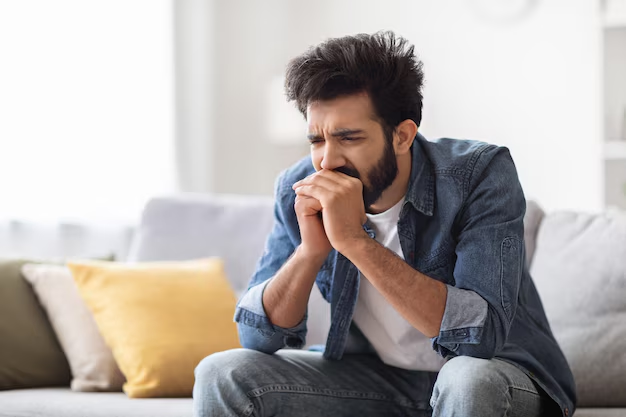Is Your Nausea Caused by Anxiety? Here's How to Tell
Feeling nauseous is never pleasant, but pinpointing the cause can add to the discomfort—even more so when anxiety could be at play. Many people experience nausea related to psychological factors, and understanding whether anxiety is the root cause can alleviate unnecessary worry.
Understanding Nausea: A Quick Look
Nausea is that unsettling feeling you get in your stomach that often precedes vomiting. It can result from a variety of factors, including:
- Gastrointestinal issues (like stomach flu or food poisoning)
- Motion sickness
- Pregnancy
- Medical treatments or medications
- Psychological factors, such as stress and anxiety
While physiological causes are more straightforward, discerning when your nausea is linked to anxiety can be a challenge. But it's a challenge worth addressing, especially when anxiety-related nausea can exacerbate stress levels.
Interconnection Between Anxiety and Physical Symptoms
The Mind-Body Connection
The human body is a complex system where mental and physical health are deeply intertwined. When we experience anxiety, our body often responds with physical manifestations, ranging from a racing heart to digestive troubles. This response is primarily due to the body's "fight-or-flight" mechanism, which can:
- Increase adrenaline and cortisol levels, leading to digestive imbalance
- Heighten stomach acid secretion, causing discomfort or nausea
- Trigger muscle tension in the abdominal region, making nausea more likely
How Anxiety-Induced Nausea Manifests
The sensation of nausea due to anxiety is not unlike nausea from other causes, making it important to identify associated symptoms that might help distinguish it:
- Butterflies in the stomach feeling when anxious
- Nausea coinciding with palms sweating, heart racing, or shortness of breath
- A "nervous stomach," especially in social or high-pressure situations
- Lingering unease without other apparent gastrointestinal symptoms
- Fluctuation in symptoms, correlating with anxiety levels
How to Identify Anxiety as the Source
Tracking Your Symptoms
One effective way to determine if anxiety is the cause is to track your symptoms:
- Journal your experiences: Note the time, context, and feelings when nausea occurs. Are you stressed, excited, or worried during these times?
- Monitor the severity: Is the nausea mild or intense?
- Observe patterns: Does it correlate with certain events, such as public speaking, before tests, or during social gatherings?
Self-reflection and Mindfulness
Increase self-awareness by practicing mindfulness and self-reflection:
- Mindfulness meditation can help you observe your body's responses without judgment, providing clarity on how anxiety impacts your physical state.
- Deep breathing exercises allow relaxation and can help you identify whether your nausea lessens when anxiety is managed.
Differentiating Anxiety from Other Causes
Consider the Context
- Recent changes or stressors: Have you experienced an increase in stress recently?
- Absence of other symptoms: Does nausea appear in isolation from other stomach-related issues like diarrhea or vomiting, which would suggest an infection?
Medical Perspective
Sometimes, seeking guidance from a healthcare professional can be invaluable. They can help differentiate between psychological and physical causes through:
- Thorough medical history: Evaluating chronic anxiety symptoms over time.
- Diagnostic tests: Rule out physical conditions that might mimic anxiety.
Coping with Anxiety-Induced Nausea
Practical Techniques
- Progressive Muscle Relaxation: Focus on each part of your body, consciously relieving tension.
- Hydration: Dehydration can worsen nausea, so maintaining fluid intake is vital.
- Light Diet: Eating bland foods can ease nausea, whereas greasy, heavy meals may intensify it.
Psychological Interventions
- Cognitive-Behavioral Therapy (CBT): Often effective for treating anxiety, thereby alleviating physical symptoms.
- Mindful Practices: Such as yoga or tai-chi, which promote bodily calmness.
Lifestyle Changes for Long-Term Relief
Establish a Routine
Create an anxiety-reducing routine that integrates:
- Consistent sleep schedule: Poor sleep can worsen both anxiety and nausea.
- Regular exercise: Physical activity releases endorphins that naturally reduce anxiety levels.
- Balanced nutrition: Incorporating healthy foods that soothe the stomach, like ginger or peppermint.
Long-Term Stress Management
Consistently managing stress will over time reduce anxiety-induced nausea:
- Hobbies and Interests: Engaging in activities you love to distract and relax the mind.
- Social Support: Creating a network of friends or family who you can talk to.
- Professional Counseling: For deeper issues or persistent anxiety, therapy can be beneficial.
Providing Peace of Mind
Finally, remember that anxiety is a natural human response and acknowledging it can be a powerful step toward managing symptoms like nausea. By gathering insights and implementing strategies, you'll better handle the anxiety, fostering a more peaceful mind and body experience.
Quick Tips & Takeaways 📋
- Symptom Tracking 🕒: Keep a log of when nausea occurs and in what context.
- Mindfulness 🧘♀️: Try meditation or deep breathing to reduce anxiety.
- Routine 🕰️: Maintain a consistent schedule with sleep and meals to buffer stress.
- Healthy Habits 🌿: Engage in regular physical activity and stay hydrated.
- Seek Professional Insight 👩⚕️: If in doubt, consult a healthcare provider for clarity.
- Community Support 👥: Talk to friends, family, or professionals to alleviate anxiety.
Recognizing nausea as a potential sign of anxiety and implementing these strategies can help manage your symptoms more effectively. 🌟

